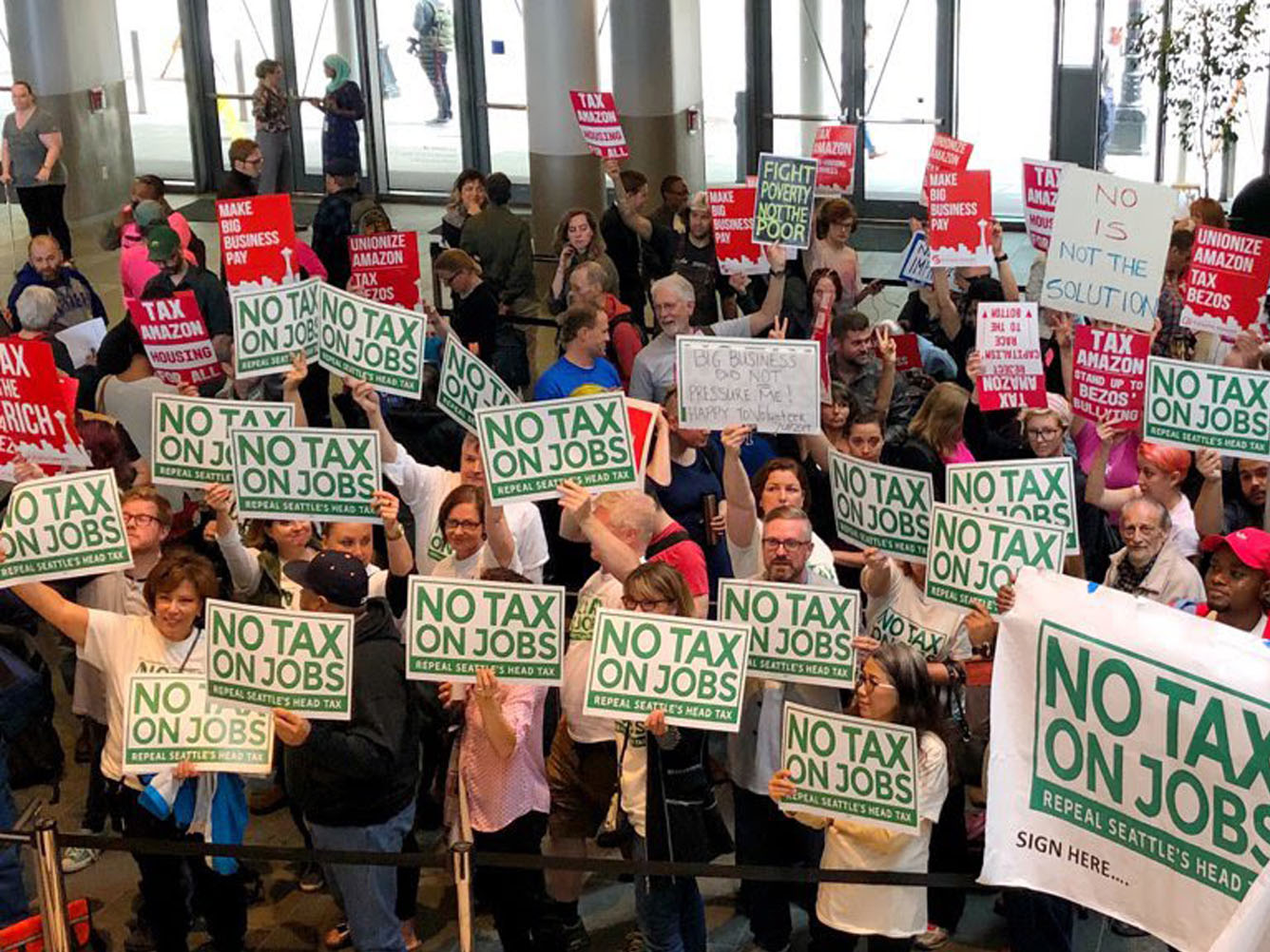News
Seattle Council Chief Shelves Payroll Tax Talks Amid Virus
Posted on

This story was originally published by Law 360 on May 8, 2020.
By James Nani
Meetings on a proposed Seattle corporate payroll tax are canceled for now because they don’t comply with the Washington governor’s order that meetings not related to the COVID-19 pandemic should be suspended, the City Council president said.
The corporate payroll tax proposal, a package of three bills, doesn’t comply with Democratic Gov. Jay Inslee’s February order, Seattle City Council President M. Lorena González, a Democrat, said Thursday. The governor’s proclamation said agencies are prohibited from taking action on matters unless they are “necessary and routine” and “necessary to respond to the COVID-19 outbreak” until regular participation under the state’s open meetings law was possible.
“This move by the Democratic establishment to cancel Tax Amazon committees through May is nothing but a naked attempt to break the momentum of our movement, which they and their wealthy benefactors are clearly nervous about,” Sawant said.
Sawant’s office didn’t immediately respond to requests for comment Friday. But in an email blast from her office late Friday, Sawant said she knew business interests and the Democratic political establishment would “resist, lie” and threaten to stop the legislation. She called on supporters to demand the City Council immediately take up the legislation, approve it without changing it and speak out against delaying it during a council meeting on Monday.
In recent weeks, González said, council members have “begun to express concerns related” to trying to comply with the state open-meetings law and Inslee’s order, Proclamation 20-28, as it relates to the payroll tax proposal. Those initial concerns, raised by Council Member Lisa Herbold on April 28, included legal advice from the city attorney’s office. González said she continued dialogue with the city attorney’s office over the package and became “increasingly concerned” about whether the substance of the measures was “routine and necessary” or sufficiently related to COVID-19, the respiratory disease caused by the novel coronavirus.
González said she issued a memo to council members Thursday explaining the implication of Inslee’s proclamation for the council, saying it would make “an immediate impact” on the consideration of the corporate payroll tax measures.
“It is incumbent upon all council members to continue complying with Proclamation 20-28 by limiting our legislative actions to items that are ‘routine and necessary’ or related to the immediate COVID-19 public health emergency,” González said.
A spokesman for the city attorney’s office said legal advice to the council was protected by attorney-client privilege. Sawant’s office noted while she rejected the “pro-corporate” interpretation of the Inslee proclamation, it expires May 31.
González said she had asked the council Select Budget Committee’s chairwoman, Teresa Mosqueda, to “strongly consider” canceling its meeting scheduled for May 13 and not hold any more public meetings on the proposed bills through at least May 31. Mosqueda, a Labor Democrat, said she agreed with the analysis and canceled the meeting.
“While I’m deeply disappointed that this urgent conversation is going to be delayed, I fully support the guidance and recommendations from the council president to both ensure transparency, accountability and participation from the public, and to protect the health and safety of city employees and attendees,” Mosqueda said in a statement Thursday.
Since the measure’s introduction, Mosqueda has held several online public hearings on the measure. The meetings have attracted strong support from some who have said large businesses should pay more in taxes, especially when smaller businesses were suffering. But they’ve also attracted strong opposition from business interests and others who believe the measure would hurt the local economy, especially since businesses are already struggling because of COVID-19.
Council staff members have said the tax would be immune to a public referendum if passed as an emergency ordinance, though the city charter requires emergency measures to have at least three-fourths of all council members and the mayor approve the measure. That means seven out of nine members would have needed to vote yes, and the council couldn’t override a mayoral veto.
In her memo, González said she believed any further council action, including briefings, discussions or meetings related to the tax package, put the council “at significant risk of litigation.” She wrote there appeared “to be wide agreement” that the package wasn’t routine or necessary and the taxation and spending plan had several components that likely wouldn’t be justified as related to COVID-19, including the Green New Deal housing strategies and other measures.
In addition, she said the tax legislation wouldn’t be collected until after 2020 and would exist after the emergency was over.
The Downtown Seattle Association, which opposed the tax, told Law360 that the measure was bad policy when a similar measure was proposed in 2018 and continued to be today.
“Council Member Sawant has been looking for an excuse to revisit her jobs tax for two years, but now there seems to be a consensus amongst most city leaders that this is not the time to engage in this debate,” the group said.
Kelsey Nyland, a spokeswoman for Democratic Mayor Jenny Durkan, said shelving the matter was in line with the “several serious flaws” Durkan has pointed out about the proposal, including arguments that it wouldn’t close the city’s budget gap or provide any immediate relief to residents.
“The mayor has spoken with council members on possible approaches to closing the city’s significant budget gap and building a more sustainable and progressive tax system, and she remains committed to working with council as the city addresses budget and economic challenges,” Nyland said.
Mike Faulk, a spokesman for Inslee’s office, told Law360 the office was singularly focused on the pandemic and would not be able to comment Friday.
A spokesman for the state Attorney General’s Office provided copies of guidance materials for local governments but said questions about interpretations of the governor’s order should be directed to the governor’s office.
–Additional reporting by Daniel Tay. Editing by John Oudens.